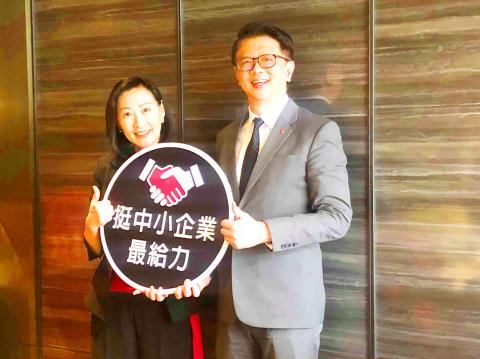DBS Bank Taiwan (星展銀行) yesterday launched application programming interface (API) solutions for corporate clients to provide them with new and improved financial and non-financial services.
Although its Singapore headquarters in November 2017 launched the API developer platform with 155 APIs covering 20 categories such as funds transfers, rewards and real-time payments, DBS Bank Taiwan is taking a more cautious approach and is introducing only three APIs.
Open banking is a system that provides users with a network of financial institutions’ data through the use of APIs.

Photo: Kao Shih-ching, Taipei Times
The three APIs would enable corporate clients to offer improved services, as they could streamline work, informational and transactional flows, DBS Bank general manager Lim Him-chuan (林鑫川) told a media briefing.
“Nowadays, many banks offer digital banking services, which might make consumers confused when they are visiting Web sites. However, with DBS’ APIs, corporate clients will be able to check the firm’s bank balance or transaction records on the firm’s accounting system,” Lin said.
The other two APIs would help companies provide real-time payments and faster transfers, Lin said.
The bank said it is working with local corporations in multiple industries — including insurance, e-commerce, gaming and retail — to improve their customer experience.
The API solutions would integrate banking services to enable corporate clients to partner with DBS Bank for improved business productivity and cocreate innovative digital solutions for their end customers, it said.
In cooperation with airports and airlines, insurers could use APIs to check if a consumer’s flight has been delayed or if their luggage is lost, it said.
DBS would help the insurer offer claims to their customers and pay directly into their bank accounts, executive director Sylvia Tao (陶曉昀) said, adding that the bank would introduce more APIs into the nation as demand increases.
The bank is also looking for opportunities to cooperate with companies in non-financial sectors to expand its business, Lin said.
DBS has been promoting the open banking concept and was last month invited by the Financial Supervisory Commission to join a committee to help update regulations, Lin said.
DBS Bank Taiwan is the only foreign bank on the committee.
DBS has been stepping up collaboration with governments, partners, fintech firms, start-ups and other members of the ecosystem to make banking simpler and seamless for customers through the use of partner APIs, it said.

UNCERTAINTIES: Exports surged 34.1% and private investment grew 7.03% to outpace expectations in the first half, although US tariffs could stall momentum The Chung-Hua Institution for Economic Research (CIER, 中華經濟研究院) yesterday raised its GDP growth forecast to 3.05 percent this year on a robust first-half performance, but warned that US tariff threats and external uncertainty could stall momentum in the second half of the year. “The first half proved exceptionally strong, allowing room for optimism,” CIER president Lien Hsien-ming (連賢明) said. “But the growth momentum may slow moving forward due to US tariffs.” The tariff threat poses definite downside risks, although the scale of the impact remains unclear given the unpredictability of US President Donald Trump’s policies, Lien said. Despite the headwinds, Taiwan is likely

When Lika Megreladze was a child, life in her native western Georgian region of Guria revolved around tea. Her mother worked for decades as a scientist at the Soviet Union’s Institute of Tea and Subtropical Crops in the village of Anaseuli, Georgia, perfecting cultivation methods for a Georgian tea industry that supplied the bulk of the vast communist state’s brews. “When I was a child, this was only my mum’s workplace. Only later I realized that it was something big,” she said. Now, the institute lies abandoned. Yellowed papers are strewn around its decaying corridors, and a statue of Soviet founder Vladimir Lenin

UNIFYING OPPOSITION: Numerous companies have registered complaints over the potential levies, bringing together rival automakers in voicing their reservations US President Donald Trump is readying plans for industry-specific tariffs to kick in alongside his country-by-country duties in two weeks, ramping up his push to reshape the US’ standing in the global trading system by penalizing purchases from abroad. Administration officials could release details of Trump’s planned 50 percent duty on copper in the days before they are set to take effect on Friday next week, a person familiar with the matter said. That is the same date Trump’s “reciprocal” levies on products from more than 100 nations are slated to begin. Trump on Tuesday said that he is likely to impose tariffs

READY TO BUY: Shortly after Nvidia announced the approval, Chinese firms scrambled to order the H20 GPUs, which the company must send to the US government for approval Nvidia Corp chief executive officer Jensen Huang (黃仁勳) late on Monday said the technology giant has won approval from US President Donald Trump’s administration to sell its advanced H20 graphics processing units (GPUs) used to develop artificial intelligence (AI) to China. The news came in a company blog post late on Monday and Huang also spoke about the coup on China’s state-run China Global Television Network in remarks shown on X. “The US government has assured Nvidia that licenses will be granted, and Nvidia hopes to start deliveries soon,” the post said. “Today, I’m announcing that the US government has approved for us